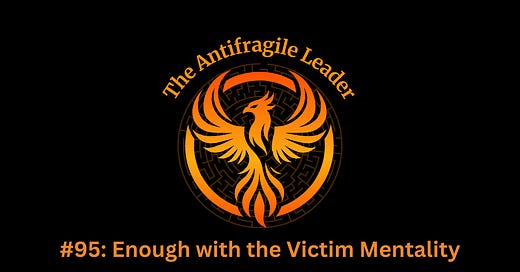👋 Hey, Leo here! Welcome to The Antifragile Leader. Each week, I explain the concepts needed to lead through uncertainty. Subscribe to get every issue in your inbox.
Hey Friends,
Welcome to the 95th edition of my newsletter.
Personal Update
I had a week off work and spent it chilling around the house with the family and working a bit on my side projects too. I have been playing around with some no-code tools and integration with OpenAI APIs as I am building a “lead magnet” for this newsletter. In short, I designed a flow that takes a user’s answers to some questions regarding their career struggles and uses AI to design a personalized roadmap with specific next steps they should take to move forward.
I hope to finish the automation by next week and let you try it on in the next newsletter.
I also took the opportunity to go skiing for a couple of days, and it was the first time we went somewhere with Zeno. Well, skiing might be a bit of a stretch, as I am only just learning how to snowboard, but it was fun taking some lessons and trying out the tricks I learned. And by tricks, I mean going down the kids’ slope and doing some turns.
Still, it was a fun getaway, and we all enjoyed it very much.




Another big win for the week is going out to dinner with my wife for the first time since the baby came. It was nice to go out after a couple of months, and we decided we would try to do this more often. Don’t worry, we didn’t leave Zeno home alone; he was with his grandma.
Oh, and I almost forgot to mention a really big breakthrough, which is the new personal record on the snatch. As one of my yearly goals (you can read about all of them below) is to snatch my bodyweight.
My new record is at 185 lbs, approx. 84 kilos, about 10 kilos less then I weigh.
Point is, my snatch is getting better and better, but if I want to reach my goal, I will probably need to lose some weight too while keeping my muscle mass. Which will not be very easy, but hey, we grow by doing difficult stuff.
Which takes me to the next point.
Enough with the Victim Mentality
I was reading a post on LinkedIn the other day about how unfair it is for someone to live with a salary of X in big cities of Romania and why the companies should do this and the government should do that.
And I commented something but deleted afterwards, because, you know, I don’t want the drama. But as this is my private newsletter :) why not?
As unfair and brutal as it may sound, nobody owes us anything.
Life is unfair. Business is tough. Leadership is lonely.
And yet, none of that is an excuse.
First of all, businesses are out there to make money; that’s the purpose of a business—to generate profit. Of course, they should abide by the laws of the countries and states in which they operate, but other than that, they focus on generating more revenue and cutting down costs.
We won’t get into the moral issue here, because that is very relative.
On the other hand, governments, in my view, should intervene in the lives of the citizens as little as possible, primarily on social topics like health, education or the safety of their citizens, and by creating an environment that fosters entrepreneurship. Any other involvement of the government in the economy of a country might interfere with the principles of the free market. (I spent my childhood in communism, so I know a bit about this.)
I won’t get into a detailed perspective of my views, but what I am trying to say is that if you believe external circumstances dictate your success, you’ve already lost.
The world doesn’t care about fairness—it rewards those who adapt, endure, and turn adversity into an advantage.
Why Victimhood Is a Trap
The victim mentality is seductive. It provides an easy escape from responsibility.
I should know; I spent most of my life in this mindset.
Complaining all the time. Thinking that life’s not fair.
Spending my evenings with a bottle of wine and blaming everything around me instead of figuring out a way to change my situation.
“The market is bad.”
“My boss doesn’t support me.”
“I wasn’t given the same opportunities as others.”
Are these things sometimes true? Absolutely.
How much does it help focusing on them?
Well, not that much. I would say it only weakens you.
I love this post from "The Daily Stoic”:
Every time you blame external factors, you trade your agency for helplessness.
The antifragile leader does the opposite.
Instead of seeing setbacks as unfair, they see them as fuel.
The Antifragile Mindset: Strength Through Adversity
Nassim Taleb defines antifragility as the ability to thrive in disorder.
Unlike something that merely resists stress (resilient) or breaks under it (fragile), the antifragile gets better from stressors.
A fragile leader blames circumstances.
A resilient leader endures them.
An antifragile leader leverages them.
Every struggle is a test—an opportunity to refine your skills, sharpen your decision-making, and build character.
Marcus Aurelius, one of history’s most pragmatic leaders, captured this perfectly:
"The impediment to action advances action. What stands in the way becomes the way."
In other words, whatever is blocking you contains the lesson you need to grow.
How to Kill the Victim Mentality and Become Antifragile
Own Everything: Take radical responsibility. Even when things aren’t your fault, act as if they are. This shifts your mindset from reactive to proactive.
Reframe Setbacks as Fuel: Every hardship is a chance to build a skill or strengthen your mindset. Lost a job? Now’s your opportunity to build something better. Bad manager? Learn how not to lead.
Detach from Fairness: Stop expecting the world to be just. The sooner you accept that life isn’t fair, the sooner you can start playing to win.
Run Toward Discomfort: Growth comes from discomfort. Seek challenges that stretch you—take on difficult projects, speak up when it’s uncomfortable, embrace situations where failure is possible.
Strengthen Your Inner Citadel: Epictetus said, "It's not what happens to you, but how you react that matters." The more you cultivate emotional discipline, the less external events will shake you.
Final Thought: Be the Cause, Not the Effect
You can either be at the mercy of circumstances or be the force that shapes them. Every moment you spend blaming others or lamenting your fate is time you could spend building something better.
You have been left out during this season's salary raises? Understand what are the things you can improve and double-down on your strengths.
You’ve been laid off? Maybe it’s time you try that business idea you had for a long time.
The taxation in your country is too aggressive, and you can’t make ends meet? Move to another country.
You always have a choice, but complaining is never the right one.
So, enough with the victim mentality.
Choose antifragility.
Choose ownership.
Choose action.
My own favorite post of the week:
Don’t forget to follow me there too, if you haven’t already.
Recommendations:
I’ve finished one of the best books I read lately about finances, psychology, and how the world works in general. It’s called Same as Ever: A Guide to What Never Changes by Morgan Housel. Housel is the author of the bestseller “The Psychology of Money” and I think this book is even better than the first one, as it talks about the things that never change no matter what happens in the world and how we can become resilient and thrive under any circumstances. (It is, in essence, a book about becoming antifragile).
This short guide on optimizing your resume by Ben Meer.
Anora is one of the best films I’ve seen in a while; go watch it. It won the Palme D’Or at Cannes 2024.
Well, I hope you liked this edition.
Stay Antifragile,
Leo
P.S. If you enjoyed this piece and want to support my writing, please consider sharing it and becoming a paid subscriber.
Thank you so much for being here!
P.P.S. If you want to read my content daily, don’t forget to follow me on LinkedIn









